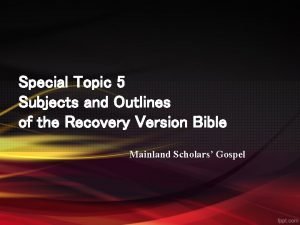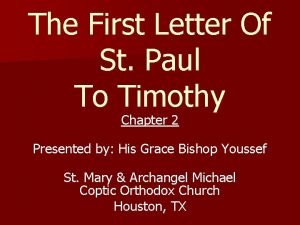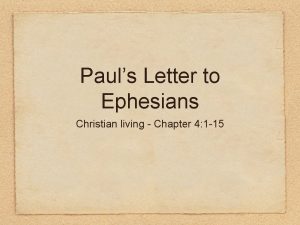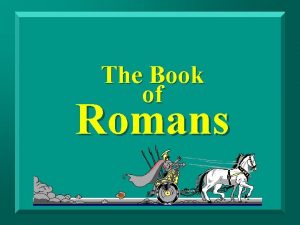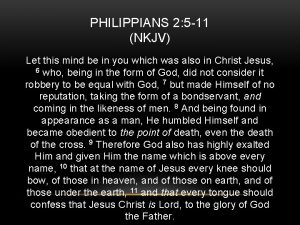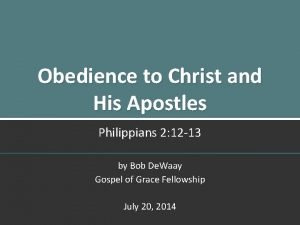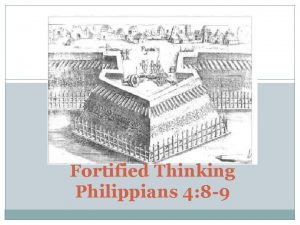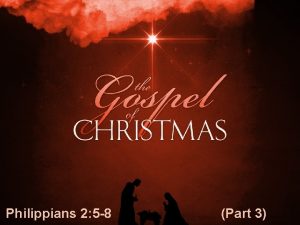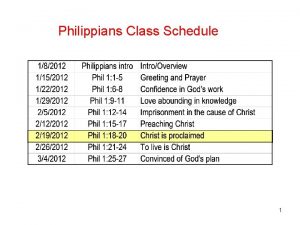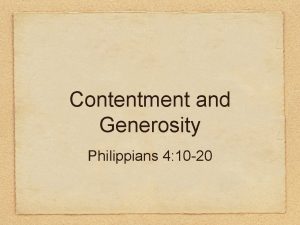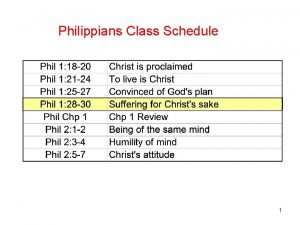The Letter Of St Paul To The Philippians




















- Slides: 20

The Letter Of St. Paul To The Philippians

Introduction • Author: St. Paul (Phil 1: 1, 1: 12 -14). • The Recipients: the church in Philippi, modern day Turkey (Phil 1: 1). • St. Paul went there in his secondary missionary trip based on a vision (Acts 16: 6 -12). • The church was established with the conversion Lydia and the jailor believed • It was a church for the gentiles

Introduction • The church at Philippi was a great source of support (Phil 4: 15 -16; 2 Cor 11: 9). • St. Paul visited the church at Philippi again on his third missionary journey (Acts 20: 3, 6). • Time and place of writing: Philippians is one of Paul's four "prison epistles" (Phil 1: 7, 13, 17) (Ephesians, Colossians, and Philemon).

Introduction • These epistles were written during St. Paul's imprisonment at Rome (Acts 28: 16, 30 -31) around 61 -63 A. D. • Purpose: – St. Paul wants to thank them for the gift that they sent (Phil 4: 10, 18) – Also to comfort them concerning his situation in prison (Phil 1: 12 -14).

Introduction • He wanted to inform them that he will send Timothy soon (Phil 2: 19 -2) • He explained to them the reasons why he will send Epaphroditus back to them (2: 25 -30). • Also he addressed the problem involving two women there (4: 2 -3). • Theme: Rejoice in the Lord

Introduction • In chapter 1, after his greetings – St. Paul explained why they were a source of joy to him – Also he elaborated on the believer’s stand regarding persecution, death, and the purpose of life

Greeting (1: 1 -2) • Timothy was with St. Paul in Rome • Although he was his son, but he treated him as a brother • Bondservants: by their own freewill, chose to be bondservants • This is the only letter that St. Paul included the clergy • Grace and peace (most needed gifts)

Thanksgiving (1: 3 -11) • Are we source of joy to our fathers and clergy? • The responsibility of the clergy in praying for their flock (Samuel the prophet) • The success of the flock should bring to the priest’s heart thanksgiving and not pride

Thanksgiving (1: 3 -11) • It is their fellowship in worship and community of life that made St. Paul joyful. • He is confident that God will perfect the fellowship in them because they are always in his heart even during the time of chains and gospel defense • They are always in his heart because of their fellowship and commitment with him in grace (chains and gospel defense).

Thanksgiving (1: 3 -11) • His love to them is not from natural affection but from devotedness to Christ Jesus. • He prays (in order for their fellowship to be perfect) that: – Their love may abound in knowledge and discernment – They approve things that are excellent

Thanksgiving (1: 3 -11) – They be sincere and without offense till Christ returns – They be filled with the fruit of righteousness: • Possible by the Lord Jesus Christ • Aiming to the glory of God.

The Situation In Rome (1: 12 -26) • St. Paul's imprisonment turned into the furtherance of the gospel (Rom 8: 28) • St. Paul’s goal was the gospel even if the cost is his chains, this makes him happy • Every body in the palace knew that his chains are because of the gospel • This made them more bold and courageous

The Situation In Rome (1: 12 -26) • The motives of preaching were: – Envy, strife, and self ambition to add (in vain) more afflictions to his chains – Goodwill, love, and sincerity fulfilling his mission. • St. Paul rejoiced because he was not seeking his own glory.

The Situation In Rome (1: 12 -26) • The joy of the faithful servant comes from the furtherance of the gospel. • St. Paul was confident of his deliverance (by life or death): – Because of their prayers – The support of the Holy Spirit (the Spirit that raised the Lord).

The Situation In Rome (1: 12 -26) • Deliverance for St. Paul: • In nothing he will not be ashamed of his work for God, or His work in him • Christ will be magnified in His body as always. • By life or death (I am winner in both situation) because to live is Christ and to die is gain.

The Situation In Rome (1: 12 -26) • To live means more fruits in service: – They still need him – His mission is not yet fulfilled • He will not choose, but submit completely to God’s will. • It is a difficult decision: to be with Christ or to fulfill his mission.

The Situation In Rome (1: 12 -26) • The Holy Spirit revealed to him that he has to finish his mission: – For their progress – Joy of faith – Joy of fellowship (in the Lord Jesus Christ for him) • I have glorified You on the earth, I have finished the work which You have given Me to do (John 17: 4)

Steadfastness In Suffering (1: 27 -30) • Let your conduct be worthy of the gospel: – Unity (one mind and one spirit) – Striving for the faith – Not terrified but confident • Sign of their salvation through God • Sign of the adversaries’ perdition

Steadfastness In Suffering (1: 27 -30) • The believer is granted: – To believe – To suffer • Suffering is the way to glory • It increases our faith • And it is participation in God’s grace • St. Paul was an example in suffering for Christ

Conclusion • What makes the heart of the shepherd rejoices? • What did St. paul ask for the Philippians in order to be perfect in their fellowship? • How did St. Paul perceive his imprisonment? • What is St. Paul’s concept of deliverance? • What is the conduct worthy of the gospel? • What is concept of suffering in Christianity?
 Letter of saint paul to the philippians
Letter of saint paul to the philippians Letter of st paul to the philippians
Letter of st paul to the philippians Philippians 1 blue letter bible
Philippians 1 blue letter bible Root letters
Root letters Paul's letter to timothy on leadership
Paul's letter to timothy on leadership St paul's letter to the galatians
St paul's letter to the galatians Letter of st paul to timothy
Letter of st paul to timothy St paul's letter to the galatians
St paul's letter to the galatians Letter of st paul to the ephesians chapter 4
Letter of st paul to the ephesians chapter 4 Romans summary
Romans summary Letter of st paul to the colossians
Letter of st paul to the colossians Paul's second letter to timothy
Paul's second letter to timothy Philippians 2:1-11 nkjv
Philippians 2:1-11 nkjv Philippians 3:1-16
Philippians 3:1-16 Philippians 1: 3-11
Philippians 1: 3-11 Philippians 1:12-18 esv
Philippians 1:12-18 esv Philippians 2 nasb
Philippians 2 nasb Philippians 4:6-9
Philippians 4:6-9 Philippians 3 15
Philippians 3 15 Philippians 4 nasb
Philippians 4 nasb 4 kinds of faith
4 kinds of faith


